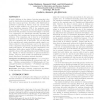Free Online Productivity Tools
i2Speak
i2Symbol
i2OCR
iTex2Img
iWeb2Print
iWeb2Shot
i2Type
iPdf2Split
iPdf2Merge
i2Bopomofo
i2Arabic
i2Style
i2Image
i2PDF
iLatex2Rtf
Sci2ools
SIGMETRICS
2006
ACM
2006
ACM
Maximizing throughput in wireless networks via gossiping
A major challenge in the design of wireless networks is the need for distributed scheduling algorithms that will efficiently share the common spectrum. Recently, a few distributed algorithms for networks in which a node can converse with at most a single neighbor at a time have been presented. These algorithms guarantee 50% of the maximum possible throughput. We present the first distributed scheduling framework that guarantees maximum throughput. It is based on a combination of a distributed matching algorithm and an algorithm that compares and merges successive matching solutions. The comparison can be done by a deterministic algorithm or by randomized gossip algorithms. In the latter case, the comparison may be inaccurate. Yet, we show that if the matching and gossip algorithms satisfy simple conditions related to their performance and to the inaccuracy of the comparison (respectively), the framework attains the desired throughput. It is shown that the complexities of our algorith...
Related Content
| Added | 14 Jun 2010 |
| Updated | 14 Jun 2010 |
| Type | Conference |
| Year | 2006 |
| Where | SIGMETRICS |
| Authors | Eytan Modiano, Devavrat Shah, Gil Zussman |
Comments (0)

